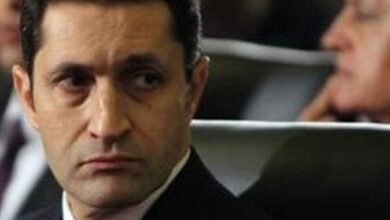Former President Hosni Mubarak's head defense lawyer blamed the armed forces during a court session Wednesday for killing protesters during the uprising last year that toppled the leader.
Attorney Farid al-Deeb said a law published in the formal government publication the Egyptian Gazette, which keeps track of new laws, states that if the armed forces take control of the country, all responsibility — including that of the police — is handed over to the military commander.
Deeb said the killings and injuries occurred when police withdrew on 28 January and the armed forces were dispatched to the streets. Law 183/1952 gives the armed forces the right to take control of the internal security situation, but, Deeb claims, also makes them fully responsible for protester deaths.
According to the law, the commander of the military forces is allowed to disperse rioters — defined as gatherings of four or more people — using live ammunition, Deeb said. He also claimed that the law gives the military the right to carry automatic weapons and fire live ammunition at "riot" leaders from rooftops.
Deeb said the law bans firing live ammunition into the air to prevent the injury of innocent people, and specifies that shots must hit their targets. He said the military announced it did not use violence against the protesters and that people must take the armed forces at its word — but that he wonders who, then, shot at the protesters.
Deeb said he had several important documents in his possession that everyone needs to see. He pointed to former General Intelligence Services Director Omar Suleiman's statements during questioning concerning the presence of armed foreign elements in the country. He also cited news reports published in state-owned newspaper Al-Akhbar on 3 and 4 February claiming that commandos from Iran, Hamas and Hezbollah had been responsible for the shootings.
A university student died Wednesday after being shot at a gas station in 15th of May City during a fight over gasoline. Another injured man was taken to the hospital and is in critical condition.
An ongoing fuel shortage is causing traffic congestion and rising tensions nationwide, leading citizens to block major arteries such as the Zagazig highway and the main road leading to the Aswan High Dam in protest.
The shooting occurred after a fight broke out among a large number of drivers at a highway gas station when dozens of people trying to fill their tanks stormed the station. Gas station employees fired a barrage of bullets to disperse the drivers and shot the man, whose first name is reportedly Zain, as he was passing in front of the station. He died immediately and was transferred to a hospital morgue.
On Tuesday, Petroleum Minister Abdullah Ghorab said about 3 million liters of gas were being delivered to gas stations nationwide and that the shortage would be over by Wednesday. At a press conference following the cabinet meeting held to discuss the crisis, Ghorab explained that such shortages occur frequently, but are usually sparked by rumors, which he said is the case for this panic.
Ghorab appealed to Egyptians not to believe the rumors, saying that gas is available and there is no need to store it.
A number of warnings issued early Saturday on Facebook and Twitter claimed that the government was planning to raise gas and diesel fuel prices in response to demands by the International Monetary Fund, Ghorab said. An IMF delegation is currently visiting Egypt.
Ghorab said that although the government denied these rumors, some gas station owners raised prices, and "jerry cans and drums” of gas are being sold on the black market. The Interior Ministry seized Monday 400,000 liters of smuggled gas, including 10,000 liters in Alexandria alone, he said.
Clarification: The headline for this story, which originally said Mubarak's lawyer held the military responsible for protesters' deaths, was changed to reflect that while Deeb said that Law 183/1952 – which gives the military the authority to shoot members of any gathering if they are acting instead of the police – holds the armed forces responsible for protesters' deaths because they were in charge after police withdrew, he later wondered who shot at the protesters if the armed forces did not.




